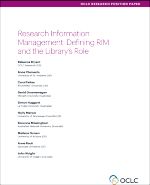Research Information Management Systems
Research information management systems (RIMS) support the transparent aggregation, curation, and utilization of data about institutional research activities. Globally, the RIM ecosystem is quite mature in locales with national requirements to collect and report the outputs of institutional research.
A pan-European community of practice is led by euroCRIS. In contrast to the European environment, where the term Current Research Information System (CRIS) is widely used and understood, a lack of standardized terminology is particularly acute in the United States and may include terms like Expert Finder System (EFS), Research Networking System (RNS), and Research Profiling System (RPS).
OCLC Research recognizes the growing importance of RIMS to research institutions and has led a program of work to demystify the complex ecosystem, particularly in North America, where RIMS adoption is accelerating. Libraries are among the many important stakeholders in this landscape. OCLC has contributed thought leadership through the publication of research reports, ongoing collaboration with euroCRIS, and programmatic leadership for developing a North American community of practice.
Research Information Management in the United States
The Research Information Management in the United States two-part report series provides a first-of-its-kind documentation of RIM practices at US research universities that presents a thorough examination of RIM use cases, goals, stakeholders, and system components.
While RIM practices are mature in Europe and other locales in support of nationalized reporting requirements, RIM practices at US research universities have taken a different—and characteristically decentralized—course. A complex environment characterized by multiple use cases, stakeholders, and systems has resulted.
This report provides a landscape overview of the state of research information management in the United States, makes sense of its complexity, and offers recommendations targeted at university leaders and other institutional decision-makers. It also provides in-depth case studies of RIM practices at four case study institutions.
Practices and Patterns in Research Information Management: Findings from a Global Survey
OCLC Research partnered with euroCRIS to conduct a web-based survey to examine how research institutions worldwide are applying RIM practices. The resulting report, Practices and Patterns in Research Information Management: Findings from a Global Survey, details the complexity of RIM practices and examines how commercial and open-source platforms are becoming widely implemented across regions, coexisting with a large number of region-specific solutions as well as locally developed systems. It also considers the urgent need for system-to-system interoperability and demonstrates how the use of identifiers, standards, and protocols are perceived as most valuable when they can also facilitate interoperability.
The report also observes the increasing functional merging of RIM systems with institutional repositories due to the growing need for improved interoperability and support for open access workflows. It documents the cross-functional teams supporting RIM activities as well as national differences.
Convenience and Compliance: Case Studies on Persistent Identifiers in European Research Information Management
This report, created in collaboration with LIBER (Ligue des Bibliothèques Européennes de Recherche – Association of European Research Libraries) provides robust case studies of RIM practices in three European national contexts—Finland, Germany, and the Netherlands. It pays close attention to the adoption and integration of person and organizational persistent identifiers (PIDs) and their role in supporting disambiguation, interoperability, and scaling. The report documents national RIM infrastructures, practices, and PID integrations that were synthesized from a series of semi-structured interviews with practitioners and stakeholders within universities, national libraries, and collaborative Information and Communications Technology (ICT) organizations
Position Paper: Research Information Management: Defining RIM and the Library’s Role
This publication provides a useful introduction to the research information management (RIM) landscape, discussing the functional uses of RIM information, the array of institutional stakeholders, and the drivers of RIM adoption. It also articulates the library's role in research information management as libraries seek to align their activities with institutional goals. It was prepared by a working group of librarians and practitioners from OCLC Research Library Partnership institutions on three continents and offers a global framework for understanding RIM practices.
Project Lead
Rebecca Bryant, Senior Program Officer
OCLC Research Blog Posts
Read more about research information management (RIM) on Hanging Together, the blog of OCLC Research.
OCLC Research Library Partnership Activities
OCLC Research collaborates with librarians from OCLC Research Library Partnership member institutions to learn, share, and collectively conduct research. The Research Support listserv provides a discussion forum exclusively for RLP members. Interested in joining us? Learn more.



